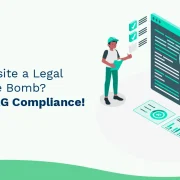
What is Healthcare Compliance Training? Everything You Need to Know
Summary
This guide covers the essentials of healthcare compliance training, explaining its importance, key components, and how to implement it effectively within healthcare organizations.
Healthcare is a major industry globally and is especially important because it ensures the safety and health of patients. Due to the size and nature of the industry, there are various regulations and compliances involved.
Given the risk and the importance of following ethical and good practices, healthcare compliance training is especially important. Here are the things you should know about healthcare compliance training for employees.
What Is Healthcare Compliance Training?
Healthcare compliance is the practice of keeping up with the different laws, regulations, and best practices. It helps prevent fraud and ensure ethical standards in healthcare services and patient treatment. This is why your healthcare employees, staff, and personnel must be trained in healthcare compliance.
According to a study by Statista, the global market for medical personnel is projected to reach $11.4 billion by the year 2027. While the recruitment numbers are high, the workforce must be adequately trained meet industry standards and compliance requirements.
Across the globe, healthcare organizations and institutions face the issue of inadequately well-trained staff. Additionally, the healthcare industry is constantly changing, with new developments treatments being available.
With new technologies and inventions, you need to ensure that your healthcare workforce can continuously build their skills and knowledge to keep up with industry trends and compliance requirements. This is where healthcare compliance training comes in.
Healthcare compliance training for employees includes various training programs that enable medical professionals and staff to learn the skills and knowledge required to meet compliance.
This includes knowledge of the multiple regulatory compliances and ethical standards that have to be met and the skills required to keep up with them. The skills involve handling medical equipment, delivering services and care to patients, and handling software and technology, including administrative software.
What Are the Benefits of Healthcare Compliance Training?
Healthcare compliance training for employees offers several benefits to your healthcare organization, clinic, hospital, or medical institution. Training programs for medical compliance also have the potential to transform the healthcare industry.
Here are some of the key benefits that can result from healthcare compliance training.
- Highly skilled and proficient staff
- Better quality of services delivered to patients
- Improved quality of healthcare and outcomes for patients
- Better brand reputation for the healthcare establishment
- Improved market reputation for the healthcare sector in a particular country or location
- Better opportunities for employees to develop skills and improve the services delivered
- Better levels of employee retention since employees are more motivated to stay on
- Improved business outcomes, brand value, and profits
- Improved safety and practices leading to reduced risk of legal claims, lawsuits, and losses incurred due to legal compensation
- Better assessment of employees’ skills and capabilities and easier assessment of gaps in knowledge and skill base
- Improved overall performance and quality of the workforce
- Easier identification of strong points and areas where there is scope for growth
- A more capable workforce that is equipped to handle work requirements and the details of compliances
- A more motivated and involved workforce as employees are encouraged with better training and improved performance
- Improved scope for skill development, growth, and continuous learning leading to a better work morale
- Better cost and time efficiency as the efficacy of services (medical and administrative) improves
- Reduced risks to patients, loss of life, and inconvenience faced in the healthcare process
- Enhanced quality of life of patients and more trust in the healthcare system
- Online healthcare training and e-learning allow employees to learn skills in an effective, convenient, and accessible way
- Interactive features in online training make the learning process more engaging and participatory, with better learning outcomes
- Features like simulations, scenarios, and game-based learning enable the workforce to be better prepared to perform the skills in real-life scenarios
Why Is Healthcare Compliance Training Important?
There are various barriers that healthcare organizations and institutions face with healthcare compliance training and ensuring that it is effective.
1. Resistance to Change
There is a reluctance to adopt a change in the existing practices and adopt the technological know-how required to manage healthcare software.
Traditional healthcare systems have mainly relied on physical records, paper records, and written documentation. Keeping up with the latest compliances often involves managing software and technology. This requires healthcare professionals and medical staff to adjust to the technological requirements.
A study found that 92% of healthcare providers are promoting digitized healthcare facilities. Modern healthcare software relies on artificial intelligence (AI) features, and this can lead to hesitancy to work with the more advanced interface.
However, with healthcare compliance training, employees become comfortable with these technologies, and the features can simplify the tasks involved.
2. Administrative Work
Healthcare compliance can involve increased administrative work, and many healthcare establishments lack the time and resources to keep up with the various compliances. This can be a barrier to the efficacy of healthcare training.
However, healthcare compliance training for employees makes them better equipped to handle these tasks efficiently and accurately.
As clinics and medical institutions have to manage large patient loads, time and administrative constraints affect their capacity. Training can help improve the time and cost-effectiveness of healthcare compliance.
3. Technical Concerns and Changing Regulations
There are various technical concerns with healthcare compliance training. These concerns include the maintenance of the software system, errors, and upgrades or updates that may be required. However, with the right learning management system and training software, it can be a convenient experience.
Additionally, healthcare laws and regulations are constantly changing. Online healthcare compliance training programs have the benefit of being easily updated, and this ensures that you keep up with the latest requirements.
Summing Up
Healthcare compliance training for employees can help your medical establishment keep up with the latest compliance requirements. It can also enable your employees to be better equipped to handle the changing needs of the medical industry.
Hurix offers training and workforce learning solutions and systems training. Our learning solutions provide interactive features such as game-based learning, simulations, and scenarios to keep your employees engaged. Get in touch with us to learn more.

Senior Vice President
Julia brings over 20 years of global experience in digital learning and business strategy. She specializes in client success, enterprise learning solutions, and driving growth through innovation, with a focus on AI, VR, and emerging technologies across diverse industry verticals.




